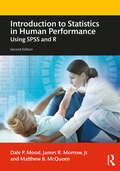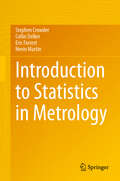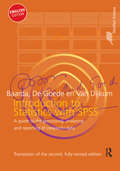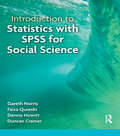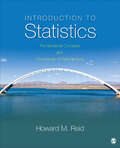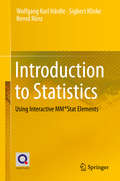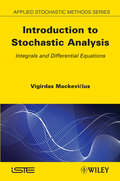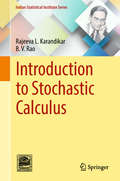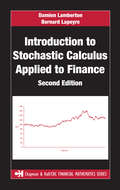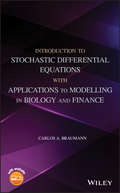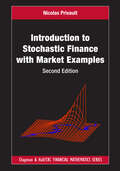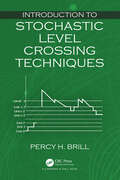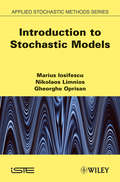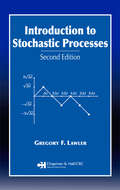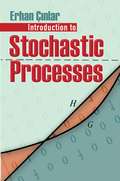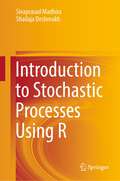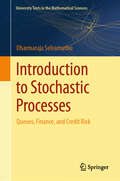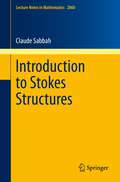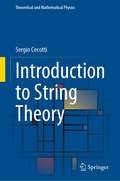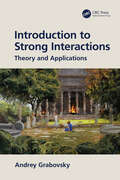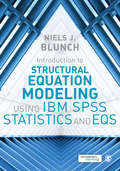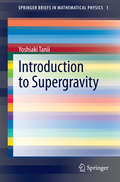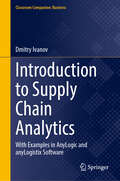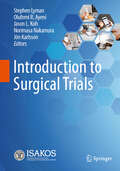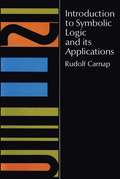- Table View
- List View
Introduction to Statistics in Human Performance: Using SPSS and R
by Dale P. Mood James R. Morrow, Jr. Matthew B. McQueenAn understanding and working knowledge of the basic principles of statistics are of central importance in understanding the sport and health sciences. Introduction to Statistics in Human Performance: Using SPSS and R provides students facing statistical problems for the first time with an accessible and informal introduction to the key concepts and procedures of statistical analysis. Now in its second edition, the book covers processes involved in using both SPSS and R, and includes chapters on: research methods descriptive statistics the normal curve and standard scores correlation and regression inferential statistics introduction issues in inferential statistics t-tests anova, factorial anova and manova advanced statistics, and nonparametric statistics Including examples relevant to the field, review questions, practice computer problems and activities throughout, and online materials including step-by-step video guides, data tables for importing into computer activities, a bank of possible test questions, and PowerPoint® slides, the book offers students all the tools they need to understand statistical concepts in sport and exercise. This is a vital resource for any students of sport and exercise science, kinesiology, physical therapy, athletic training, and fitness and health taking classes in statistics.
Introduction to Statistics in Metrology
by Stephen Crowder Collin Delker Eric Forrest Nevin MartinThis book provides an overview of the application of statistical methods to problems in metrology, with emphasis on modelling measurement processes and quantifying their associated uncertainties. It covers everything from fundamentals to more advanced special topics, each illustrated with case studies from the authors' work in the Nuclear Security Enterprise (NSE). The material provides readers with a solid understanding of how to apply the techniques to metrology studies in a wide variety of contexts. The volume offers particular attention to uncertainty in decision making, design of experiments (DOEx) and curve fitting, along with special topics such as statistical process control (SPC), assessment of binary measurement systems, and new results on sample size selection in metrology studies. The methodologies presented are supported with R script when appropriate, and the code has been made available for readers to use in their own applications. Designed to promote collaboration between statistics and metrology, this book will be of use to practitioners of metrology as well as students and researchers in statistics and engineering disciplines.
Introduction to Statistics with SPSS
by Ben Baarda De Goede Martijn Cor van DijkumIntroduction to Statistics with SPSS offers an introduction to statistics that can be used before, during or after a course on statistics. Covering a wide range of terms and techniques, including simple and multiple regressions, this book guides the student to enter data from a simple research project into a computer, provide an adequate analysis of the data and present a report on the findings.
Introduction to Statistics with SPSS for Social Science
by Dennis Howitt Duncan Cramer Gareth Norris Faiza QureshiThis is a complete guide to statistics and SPSS for social science students. Statistics with SPSS for Social Science provides a step-by-step explanation of all the important statistical concepts, tests and procedures. It is also a guide to getting started with SPSS, and includes screenshots to illustrate explanations. With examples specific to social sciences, this text is essential for any student in this area.
Introduction to Statistics: Fundamental Concepts and Procedures of Data Analysis
by Howard M. ReidUsing a truly accessible and reader-friendly approach, this comprehensive introduction to statistics redefines the way statistics can be taught and learned. Unlike other books that merely focus on procedures, Reid’s approach balances development of critical thinking skills with application of those skills to contemporary statistical analysis. He goes beyond simply presenting techniques by focusing on the key concepts readers need to master in order to ensure their long-term success. Indeed, this exciting new book offers the perfect foundation upon which readers can build as their studies and careers progress to more advanced forms of statistics. Keeping computational challenges to a minimum, Reid shows readers not only how to conduct a variety of commonly used statistical procedures, but also when each procedure should be utilized and how they are related. Following a review of descriptive statistics, he begins his discussion of inferential statistics with a two-chapter examination of the Chi Square test to introduce students to hypothesis testing, the importance of determining effect size, and the need for post hoc tests. When more complex procedures related to interval/ratio data are covered, students already have a solid understanding of the foundational concepts involved. Exploring challenging topics in an engaging and easy-to-follow manner, Reid builds concepts logically and supports learning through robust pedagogical tools, the use of SPSS, numerous examples, historical quotations, insightful questions, and helpful progress checks.
Introduction to Statistics: Using Interactive MM*Stat Elements
by Wolfgang Karl Härdle Sigbert Klinke Bernd RönzThis book covers all the topics found in introductory descriptive statistics courses, including simple linear regression and time series analysis, the fundamentals of inferential statistics (probability theory, random sampling and estimation theory), and inferential statistics itself (confidence intervals, testing).Each chapter starts with the necessary theoretical background, which is followed by a variety of examples. The core examples are based on the content of the respective chapter, while the advanced examples, designed to deepen students’ knowledge, also draw on information and material from previous chapters.The enhanced online version helps students grasp the complexity and the practical relevance of statistical analysis through interactive examples and is suitable for undergraduate and graduate students taking their first statistics courses, as well as for undergraduate students in non-mathematical fields, e.g. economics, the social sciences etc.
Introduction to Stochastic Analysis: Integrals and Differential Equations
by Vigirdas MackeviciusThis is an introduction to stochastic integration and stochastic differential equations written in an understandable way for a wide audience, from students of mathematics to practitioners in biology, chemistry, physics, and finances. The presentation is based on the naïve stochastic integration, rather than on abstract theories of measure and stochastic processes. The proofs are rather simple for practitioners and, at the same time, rather rigorous for mathematicians. Detailed application examples in natural sciences and finance are presented. Much attention is paid to simulation diffusion processes. The topics covered include Brownian motion; motivation of stochastic models with Brownian motion; Itô and Stratonovich stochastic integrals, Itô’s formula; stochastic differential equations (SDEs); solutions of SDEs as Markov processes; application examples in physical sciences and finance; simulation of solutions of SDEs (strong and weak approximations). Exercises with hints and/or solutions are also provided.
Introduction to Stochastic Calculus (Indian Statistical Institute Series)
by Rajeeva L. Karandikar B. V. RaoThis book sheds new light on stochastic calculus, the branch of mathematics that is most widely applied in financial engineering and mathematical finance. The first book to introduce pathwise formulae for the stochastic integral, it provides a simple but rigorous treatment of the subject, including a range of advanced topics. The book discusses in-depth topics such as quadratic variation, Ito formula, and Emery topology. The authors briefly address continuous semi-martingales to obtain growth estimates and study solution of a stochastic differential equation (SDE) by using the technique of random time change. Later, by using Metivier–Pellaumail inequality, the solutions to SDEs driven by general semi-martingales are discussed. The connection of the theory with mathematical finance is briefly discussed and the book has extensive treatment on the representation of martingales as stochastic integrals and a second fundamental theorem of asset pricing. Intended for undergraduate- and beginning graduate-level students in the engineering and mathematics disciplines, the book is also an excellent reference resource for applied mathematicians and statisticians looking for a review of the topic.
Introduction to Stochastic Calculus Applied to Finance (Chapman and Hall/CRC Financial Mathematics Series)
by Damien Lamberton Bernard LapeyreSince the publication of the first edition of this book, the area of mathematical finance has grown rapidly, with financial analysts using more sophisticated mathematical concepts, such as stochastic integration, to describe the behavior of markets and to derive computing methods. Maintaining the lucid style of its popular predecessor, this concise and accessible introduction covers the probabilistic techniques required to understand the most widely used financial models. Along with additional exercises, this edition presents fully updated material on stochastic volatility models and option pricing as well as a new chapter on credit risk modeling. It contains many numerical experiments and real-world examples taken from the authors' own experiences. The book also provides all of the necessary stochastic calculus theory and implements some of the algorithms using SciLab. Key topics covered include martingales, arbitrage, option pricing, and the Black-Scholes model.
Introduction to Stochastic Differential Equations with Applications to Modelling in Biology and Finance
by Carlos A. BraumannA comprehensive introduction to the core issues of stochastic differential equations and their effective application Introduction to Stochastic Differential Equations with Applications to Modelling in Biology and Finance offers a comprehensive examination to the most important issues of stochastic differential equations and their applications. The author — a noted expert in the field — includes myriad illustrative examples in modelling dynamical phenomena subject to randomness, mainly in biology, bioeconomics and finance, that clearly demonstrate the usefulness of stochastic differential equations in these and many other areas of science and technology. The text also features real-life situations with experimental data, thus covering topics such as Monte Carlo simulation and statistical issues of estimation, model choice and prediction. The book includes the basic theory of option pricing and its effective application using real-life. The important issue of which stochastic calculus, Itô or Stratonovich, should be used in applications is dealt with and the associated controversy resolved. Written to be accessible for both mathematically advanced readers and those with a basic understanding, the text offers a wealth of exercises and examples of application. This important volume: Contains a complete introduction to the basic issues of stochastic differential equations and their effective application Includes many examples in modelling, mainly from the biology and finance fields Shows how to: Translate the physical dynamical phenomenon to mathematical models and back, apply with real data, use the models to study different scenarios and understand the effect of human interventions Conveys the intuition behind the theoretical concepts Presents exercises that are designed to enhance understanding Offers a supporting website that features solutions to exercises and R code for algorithm implementation Written for use by graduate students, from the areas of application or from mathematics and statistics, as well as academics and professionals wishing to study or to apply these models, Introduction to Stochastic Differential Equations with Applications to Modelling in Biology and Finance is the authoritative guide to understanding the issues of stochastic differential equations and their application.
Introduction to Stochastic Finance with Market Examples (Chapman and Hall/CRC Financial Mathematics Series)
by Nicolas PrivaultIntroduction to Stochastic Finance with Market Examples, Second Edition presents an introduction to pricing and hedging in discrete and continuous-time financial models, emphasizing both analytical and probabilistic methods. It demonstrates both the power and limitations of mathematical models in finance, covering the basics of stochastic calculus for finance, and details the techniques required to model the time evolution of risky assets. The book discusses a wide range of classical topics including Black–Scholes pricing, American options, derivatives, term structure modeling, and change of numéraire. It also builds up to special topics, such as exotic options, stochastic volatility, and jump processes. New to this Edition New chapters on Barrier Options, Lookback Options, Asian Options, Optimal Stopping Theorem, and Stochastic Volatility Contains over 235 exercises and 16 problems with complete solutions available online from the instructor resources Added over 150 graphs and figures, for more than 250 in total, to optimize presentation 57 R coding examples now integrated into the book for implementation of the methods Substantially class-tested, so ideal for course use or self-study With abundant exercises, problems with complete solutions, graphs and figures, and R coding examples, the book is primarily aimed at advanced undergraduate and graduate students in applied mathematics, financial engineering, and economics. It could be used as a course text or for self-study and would also be a comprehensive and accessible reference for researchers and practitioners in the field.
Introduction to Stochastic Level Crossing Techniques
by Percy H. BrillIntroduction to Stochastic Level Crossing Techniques describes stochastic models and their analysis using the System Point Level Crossing method (abbreviated SPLC or LC). This involves deriving probability density functions (pdfs) or cumulative probability distribution functions (cdfs) of key random variables, applying simple level-crossing limit theorems developed by the author. The pdfs and/or cdfs are used to specify operational characteristics about the stochastic model of interest. The chapters describe distinct stochastic models and associated key random variables in the models. For each model, a figure of a typical sample path (realization, i.e., tracing over time) of the key random variable is displayed. For each model, an analytic (Volterra) integral equation for the stationary pdf of the key random variable is created−by inspection of the sample path, using the simple LC limit theorems. This LC method bypasses a great deal of algebra, usually required by other methods of analysis. The integral equations will be solved directly, or computationally. This book is meant for students of mathematics, management science, engineering, natural sciences, and researchers who use applied probability. It will also be useful to technical workers in a range of professions. Key Features: A description of one representative stochastic model (e.g., a single-server M/G/1 queue; a multiple server M/M/c queue; an inventory system; etc.) Construction of a typical sample path of the key random variable of interest (e.g., the virtual waiting time or workload in queues; the net on-hand inventory in inventory systems; etc.) Statements of the simple LC theorems, which connect the sample-path upcrossing and downcrossing rates across state-space levels, to simple mathematical functions of the stationary pdf of the key random variable, at those state-space levels Creation of (usually Volterra) integral equations for the stationary pdf of the key random variable, by inspection of the sample path Direct analytic solution of the integral equations, where feasible; or, computational solutions of the integral equations Use of the derived stationary pdfs for obtaining operational characteristics of the model
Introduction to Stochastic Models
by Nikolaos Limnios Marius Iosifescu Gheorghe OprisanThis book provides a pedagogical examination of the way in which stochastic models are encountered in applied sciences and techniques such as physics, engineering, biology and genetics, economics and social sciences. It covers Markov and semi-Markov models, as well as their particular cases: Poisson, renewal processes, branching processes, Ehrenfest models, genetic models, optimal stopping, reliability, reservoir theory, storage models, and queuing systems. Given this comprehensive treatment of the subject, students and researchers in applied sciences, as well as anyone looking for an introduction to stochastic models, will find this title of invaluable use.
Introduction to Stochastic Processes (Chapman & Hall/CRC Probability Series)
by Gregory F. LawlerEmphasizing fundamental mathematical ideas rather than proofs, Introduction to Stochastic Processes, Second Edition provides quick access to important foundations of probability theory applicable to problems in many fields. Assuming that you have a reasonable level of computer literacy, the ability to write simple programs, and the access to software for linear algebra computations, the author approaches the problems and theorems with a focus on stochastic processes evolving with time, rather than a particular emphasis on measure theory.For those lacking in exposure to linear differential and difference equations, the author begins with a brief introduction to these concepts. He proceeds to discuss Markov chains, optimal stopping, martingales, and Brownian motion. The book concludes with a chapter on stochastic integration. The author supplies many basic, general examples and provides exercises at the end of each chapter.New to the Second Edition:Expanded chapter on stochastic integration that introduces modern mathematical finance Introduction of Girsanov transformation and the Feynman-Kac formula Expanded discussion of Itô's formula and the Black-Scholes formula for pricing options New topics such as Doob's maximal inequality and a discussion on self similarity in the chapter on Brownian motionApplicable to the fields of mathematics, statistics, and engineering as well as computer science, economics, business, biological science, psychology, and engineering, this concise introduction is an excellent resource both for students and professionals.
Introduction to Stochastic Processes (Dover Books on Mathematics)
by Erhan CinlarThis clear presentation of the most fundamental models of random phenomena employs methods that recognize computer-related aspects of theory. The text emphasizes the modern viewpoint, in which the primary concern is the behavior of sample paths. By employing matrix algebra and recursive methods, rather than transform methods, it provides techniques readily adaptable to computing with machines.Topics include probability spaces and random variables, expectations and independence, Bernoulli processes and sums of independent random variables, Poisson processes, Markov chains and processes, and renewal theory. Assuming some background in calculus but none in measure theory, the complete, detailed, and well-written treatment is suitable for engineering students in applied mathematics and operations research courses as well as those in a wide variety of other scientific fields. Many numerical examples, worked out in detail, appear throughout the text, in addition to numerous end-of-chapter exercises and answers to selected exercises.
Introduction to Stochastic Processes Using R
by Shailaja Deshmukh Sivaprasad MadhiraThis textbook presents some basic stochastic processes, mainly Markov processes. It begins with a brief introduction to the framework of stochastic processes followed by the thorough discussion on Markov chains, which is the simplest and the most important class of stochastic processes. The book then elaborates the theory of Markov chains in detail including classification of states, the first passage distribution, the concept of periodicity and the limiting behaviour of a Markov chain in terms of associated stationary and long run distributions. The book first illustrates the theory for some typical Markov chains, such as random walk, gambler's ruin problem, Ehrenfest model and Bienayme-Galton-Watson branching process; and then extends the discussion when time parameter is continuous. It presents some important examples of a continuous time Markov chain, which include Poisson process, birth process, death process, birth and death processes and their variations. These processes play a fundamental role in the theory and applications in queuing and inventory models, population growth, epidemiology and engineering systems. The book studies in detail the Poisson process, which is the most frequently applied stochastic process in a variety of fields, with its extension to a renewal process. The book also presents important basic concepts on Brownian motion process, a stochastic process of historic importance. It covers its few extensions and variations, such as Brownian bridge, geometric Brownian motion process, which have applications in finance, stock markets, inventory etc. The book is designed primarily to serve as a textbook for a one semester introductory course in stochastic processes, in a post-graduate program, such as Statistics, Mathematics, Data Science and Finance. It can also be used for relevant courses in other disciplines. Additionally, it provides sufficient background material for studying inference in stochastic processes. The book thus fulfils the need of a concise but clear and student-friendly introduction to various types of stochastic processes.
Introduction to Stochastic Processes: Queues, Finance, and Credit Risk (University Texts in the Mathematical Sciences)
by Dharmaraja SelvamuthuThis is an essential textbook for senior undergraduate and graduate students of statistics, stochastic processes, stochastic finance, and probability theory. It covers all the important notations of probability theory and stochastic processes that are crucial for students to overcome their initial challenges during their studies. It thoroughly discusses the concepts of stochastic processes, both Markov and non-Markov processes, as well as stochastic calculus. With a special focus on finance, the book dedicates three chapters to explore the applications of stochastic processes in options, credit risk and insurance. Organized into sixteen chapters and one appendix, the book takes the readers to a well-organized learning. To fully grasp the intricacies of stochastic processes, students are expected to have a solid grounding in real analysis, linear algebra, and differential equations. Practical examples are emphasized throughout the book, carefully selected from various fields. The exercises at the end of each chapter are designed with the same objective in mind. Stochastic processes play a significant role in various scientific disciplines and real-life applications.
Introduction to Stokes Structures
by Claude SabbahThis research monograph provides a geometric description of holonomic differential systems in one or more variables. Stokes matrices form the extended monodromy data for a linear differential equation of one complex variable near an irregular singular point. The present volume presents the approach in terms of Stokes filtrations. For linear differential equations on a Riemann surface, it also develops the related notion of a Stokes-perverse sheaf. This point of view is generalized to holonomic systems of linear differential equations in the complex domain, and a general Riemann-Hilbert correspondence is proved for vector bundles with meromorphic connections on a complex manifold. Applications to the distributions solutions to such systems are also discussed, and various operations on Stokes-filtered local systems are analyzed.
Introduction to String Theory (Theoretical and Mathematical Physics)
by Sergio CecottiGraduate students typically enter into courses on string theory having little to no familiarity with the mathematical background so crucial to the discipline. As such, this book, based on lecture notes, edited and expanded, from the graduate course taught by the author at SISSA and BIMSA, places particular emphasis on said mathematical background. The target audience for the book includes students of both theoretical physics and mathematics. This explains the book’s "strange" style: on the one hand, it is highly didactic and explicit, with a host of examples for the physicists, but, in addition, there are also almost 100 separate technical boxes, appendices, and starred sections, in which matters discussed in the main text are put into a broader mathematical perspective, while deeper and more rigorous points of view (particularly those from the modern era) are presented. The boxes also serve to further shore up the reader’s understanding of the underlying math. In writing this book, the author’s goal was not to achieve any sort of definitive conciseness, opting instead for clarity and "completeness". To this end, several arguments are presented more than once from different viewpoints and in varying contexts.
Introduction to Strong Interactions: Theory and Applications
by Andrey GrabovskyThis is a problem-oriented introduction to the main ideas, methods, and problems needed to form a basic understanding of the theory of strong interactions. Each section contains solid but concise technical foundations to key concepts of the theory, and the level of rigor is appropriate for readers with a background in physics (rather than mathematics). It begins with a foundational introduction to topics including SU(N) group, hadrons and effective SU(3) symmetric flavor lagrangians, constituent quarks in hadrons, quarks and gluons as fundamental fields. It then discusses Quantum chromodynamics as a gauge field theory, functional integration, and Wilson lines and loops, before moving on to discuss gauge–fixing and Faddeev – Popov ghosts, Becchi-Rouet-Stora-Tyutin symmetry, and lattice methods. It concludes with a discussion on the anomalies and the strong CP problem, effective action, chiral perturbation theory, deep inelastic scattering, and derivation and solution of the Dokshitzer - Gribov - Lipatov - Altarelli - Parisi equations. Constructed as a one-term course on strong interactions for advanced students, it will be a useful self-study guide for graduate and PhD students of high energy physics, Quantum Chromodynamics, and the Standard Model.
Introduction to Structural Equation Modeling Using IBM SPSS Statistics and EQS
by Niels J. BlunchThis student orientated guide to structural equation modeling promotes theoretical understanding and inspires students with the confidence to successfully apply SEM. Assuming no previous experience, and a minimum of mathematical knowledge, this is an invaluable companion for students taking introductory SEM courses in any discipline. Niels Blunch shines a light on each step of the structural equation modeling process, providing a detailed introduction to SPSS and EQS with a focus on EQS' excellent graphical interface. He also sets out best practice for data entry and programming, and uses real life data to show how SEM is applied in research. The book includes: Learning objectives, key concepts and questions for further discussion in each chapter. Helpful diagrams and screenshots to expand on concepts covered in the texts. A wide variety of examples from multiple disciplines and real world contexts. Exercises for each chapter on an accompanying companion website. A detailed glossary. Clear, engaging and built around key software, this is an ideal introduction for anyone new to SEM. Available with Perusall—an eBook that makes it easier to prepare for class Perusall is an award-winning eBook platform featuring social annotation tools that allow students and instructors to collaboratively mark up and discuss their SAGE textbook. Backed by research and supported by technological innovations developed at Harvard University, this process of learning through collaborative annotation keeps your students engaged and makes teaching easier and more effective. Learn more.
Introduction to Supergravity
by Yoshiaki TaniiThis book is a pedagogical introduction to supergravity, a gravitational field theory that includes supersymmetry (symmetry between bosons and fermions) and is a generalization of Einstein's general relativity. Supergravity provides a low-energy effective theory of superstring theory, which has attracted much attention as a candidate for the unified theory of fundamental particles, and it is a useful tool for studying non-perturbative properties of superstring theory such as D-branes and string duality. This work considers classical supergravities in four and higher spacetime dimensions with their applications to superstring theory in mind. More concretely, it discusses classical Lagrangians (or field equations) and symmetry properties of supergravities. Besides local symmetries, supergravities often have global non-compact symmetries, which play a crucial role in their applications to superstring theory. One of the main features of this book is its detailed discussion of these non-compact symmetries. The aim of the book is twofold. One is to explain the basic ideas of supergravity to those who are not familiar with it. Toward that end, the discussions are made both pedagogical and concrete by stating equations explicitly. The other is to collect relevant formulae in one place so as to be useful for applications to string theory. The subjects discussed in this book include the vielbein formulation of gravity, supergravities in four dimensions, possible types of spinors in various dimensions, superalgebras and supermultiplets, non-linear sigma models for non-compact Lie groups, electric-magnetic duality symmetries, supergravities in higher dimensions, dimensional reductions, and gauged and massive supergravities.
Introduction to Supply Chain Analytics: With Examples in AnyLogic and anyLogistix Software (Classroom Companion: Business)
by Dmitry IvanovThe book offers a concise yet comprehensive introduction to supply chain analytics covering management, modeling, and technology perspectives. Designed to accompany the textbook “Global Supply Chain and Operations Management”, it addresses the topics of supply chain analytics in more depth. The book describes descriptive, predictive, and prescriptive supply chain analytics explaining methodologies, illustrating method applications with the use of training exercises, and providing numerous examples in AnyLogic and anyLogistix software. Throughout the book, numerous practical examples and short case studies are given to illustrate theoretical concepts. Along with AnyLogic and anyLogistix model development guidelines and examples, the book has two other distinct features. First, it reviews and explains novel frameworks and concepts related to data-driven decision-making and digital twins. Second, it shows how to use analytics to improve supply chain resilience.Without relying heavily on mathematical derivations, the book offers a structured presentation and explanation of major supply chain analytics techniques and principles in a simple, predictable format to make it easy to understand for students and professionals with both management and engineering backgrounds. Graduate/Ph.D. students and supply chain professionals alike would benefit from a structured and didactically-oriented concise presentation of the concepts, principles, and methods of supply chain analytics. Providing graduate students and supply chain managers with working knowledge of basic and advanced supply chain analytics, this book contributes to improving knowledge-awareness of decision-making in increasingly data-driven and digital environments. The book is supplemented by a companion website offering interactive exercises with the use of AnyLogic and anyLogistix software as well as Spreadsheet Modeling.
Introduction to Surgical Trials
by Norimasa Nakamura Olufemi R. Ayeni Jón Karlsson Jason L. Koh Stephen LymanFilling a gap in literature, this book examines surgical trials with a special focus on the underlying principles, challenges, and best practices to successfully conduct rigorous surgical research.While randomized controlled trials (RCTs) remain the gold standard for evaluation of the safety and efficacy of most medical interventions, they are particularly difficult to implement successfully in the context of surgery. As a result, recruitment rates are often extremely low, crossover from non-operative to operative is common, and patients randomly allocated to surgery often simply decline to have the procedure. All of these challenges call into question the recent generalizability and fundamental quality of traditional surgical RCTs. As such, this book explores advanced alternative trial design methods and describes the current regulatory environment around the world. Designed as a practical guide, it is a valuable tool for surgeons, epidemiologist and biostatisticians involved in this challenging field.
Introduction to Symbolic Logic and Its Applications
by Rudolf CarnapA clear, comprehensive, and rigorous treatment develops the subject from elementary concepts to the construction and analysis of relatively complex logical languages. It then considers the application of symbolic logic to the clarification and axiomatization of theories in mathematics, physics, and biology. Hundreds of problems, examples, and exercises. 1958 edition.
